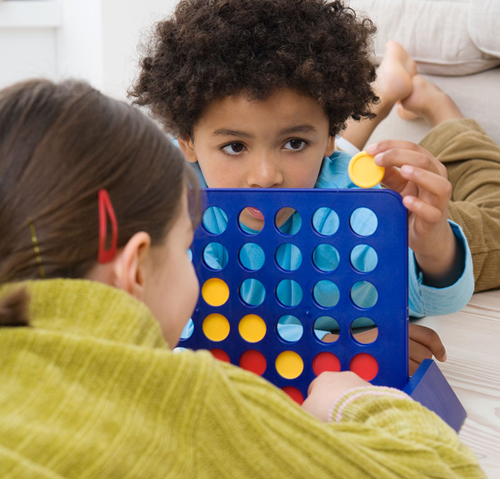ADHD Attention deficit hyperactivity disorder
Children with
a diagnosis of attention deficit hyperactivity disorder (ADHD) have
difficulties in three core areas: inattention, overactivity, and
impulsiveness. Usually these are found together. However, some children
are primarily overactive and impulsive, whereas others struggle more
with attention and concentration. Children with attention/concentration
difficulties were previously referred to as having attention deficit
disorder (ADD), but this term is no longer in use. ADHD affects your
child’s thinking skills, emotions, and behavior. Cognitively, your child
may be very distractible, have a short attention span, find it
difficult to plan and organize himself, and struggle to see the
consequences of his behavior. Emotionally, he may be excitable, lack
impulse control, and have a low tolerance threshold when things don’t go
his way. Behavior is characterized by persistently high levels of
activity, restlessness, and risk-taking. Estimates vary, but ADHD is
thought to affect three to nine percent of children and young people,
with more boys than girls receiving the diagnosis.
| Q: |
What does it mean for my child?
| | A: |
Children with ADHD have difficulty filtering unimportant
information from important information. Their attentional “net” is too
broad most times (but other times can become so focused that it’s hard
to break out of an activity such as video play). This means that he will
often be criticized or reprimanded for “not paying attention” or “not
keeping up with the class.” His hands will fidget and his body may be in
constant motion. He likely has difficulties planning ahead, getting
organized, and completing (even brief) tasks once begun. Lack of impulse
control means that he may shout out answers at school, have difficulty
taking turns, and be more likely to engage in potentially risky
activities such as skateboarding down that very steep road with no
helmet or pads.
These difficulties mean
that your child may find it harder to conform to expectations and
follow social, home, and school rules regarding his behavior. Making and
keeping friends can also be a problem if he moves quickly from activity
to activity and fails to take turns in games. A lack of understanding
regarding the nature of difficulties associated with ADHD may result in
children being labeled as “bad.” This can undermine children’s
self-esteem and lead to feelings of failure, frustration, and sadness.
However, children with ADHD have many strengths, too. They are often
creative problem-solvers, have good long-term memory, are enthusiastic,
and can be very creative.
|
| Q: |
What causes it?
| | A: |
All children differ in terms of their attentional skills,
activity level, and impulsiveness. Only those with the most severe
difficulties, impacting significantly on their own well-being and
ability to function at home and school, will receive a diagnosis. The
exact causes of ADHD are unknown, but several possible explanations have
been suggested. Genetic factors may play a part, since parents and
siblings of a child with ADHD are four to five times more likely to
receive a diagnosis themselves. However, no direct genetic link has been
established, which suggests that it is the interaction between
inherited temperament and environment that may lead to some children
developing ADHD.
Difficulties during
pregnancy have also been proposed as a possible cause. Risk factors such
as maternal smoking or alcohol use, problems in the womb, and low birth
weight are also present in many children without ADHD though. Again it
is the interaction of these issues with other factors that may be
important. Other explanations have focused on possible differences in
brain functioning. Messages in the brain are carried by chemicals called
neurotransmitters, which switch on or turn off communication pathways.
Differences in how the brain uses the neurotransmitters dopamine,
noradrenaline, and adrenaline in the areas responsible for controlling
attention, inhibiting behavior, and planning and organizing have been
argued to account for the core difficulties of ADHD.
|
| Q: |
What can I do to help?
| | A: |
The behaviors associated with ADHD can affect many areas of your
child’s life, so it is important to share information and work together
with other people involved in his care, particularly school staff. As a
first-line treatment, you may be invited to attend a parenting program.
This does not mean that professionals are blaming you for causing your
child’s difficulties or that you are a “bad” parent. An appropriate
parenting program will equip you with up-to-date knowledge and the most
effective strategies. In addition, your child may be offered individual
psychological support and/or a place in a group therapy. These groups
aim to help him get along better with his peers and develop
problem-solving skills, behavioral self-control, and listening skills.
If your child has
very significant difficulties or if problems persist over time,
medication may be an option. Depending on his needs he may be offered
methylphenidate, atomoxetine, or dexamphetamine. These drugs are thought
to work by acting on those parts of the brain where key
neurotransmitters are not thought to be functioning effectively.
Support groups for
parents of children with ADHD can also be a useful source of
information, advice and access to social and leisure opportunities for
your child.
|
| Q: |
How do I get my child tested?
| | A: |
Talk to your doctor, who can arrange for you to see a
specialist. Tests may be conducted by a pediatrician, child
psychiatrist, clinical psychologist, or other appropriately qualified
healthcare professional. Some areas have specialist ADHD teams that
offer assessment, diagnosis, and support services to families.
|
Full of energy
Children with ADHD are often restless, overactive, and lacking in impulse control.

Paying attention
A child with ADHD may struggle to sit still and focus on a task that others find simple.

|